- Home
- M G Vassanji
The Book of Secrets Page 8
The Book of Secrets Read online
Page 8
As they emerged from the bushes and reached the edge of the town, in some haste now, a figure appeared from behind the line of houses there and stood near the mosque. It was Mariamu. He had not seen her since her release from the Mission. As he passed she did not look at him, but turned her covered head away as modesty and custom demanded.
He was now walking parallel to the row of houses. She was behind him. In a sudden mischievous move, he turned, catching her unawares, and met her eyes. She stood tall, her red pachedi having fallen on her shoulders, revealing her long thick black hair, her eyes dark and deep — a vagrant with the bearing of a queen, as she refused to turn away a second time.
Who should be waiting for him when he got back but the indefatigable mukhi, with a suggestion.
“Two birds with one stone, bwana, as the proverb goes.” Jamali nodded his head in affirmation of his brilliant idea. “Mariamu will be your housekeeper and cook for you — better even than your Thomas. She has training — both in Swahili and Indian … Punjabi, Gujarati. She will sleep in the kitchen outside. Until the young man Pipa comes and takes her away. God willing.”
Corbin couldn’t have agreed more. The girl was now his responsibility too. As Jamali put it, what better arrangement than that the girl be housekeeper to Bwana Corbin, who could keep an eye on her? The girl’s wedding had been postponed too long, said the mukhi, due to her problems with the spirit. It would now take place in five weeks, during which time it was better if she lived where she was not reminded of her unhappy experiences. Corbin was pleased at this outcome, this show of the towns-people’s renewed trust in him. And Jamali went away happy, rubbing his hands, very much the successful troubleshooter. “Perhaps you’ll invite us to dine next,” he grinned from the doorway, pointing to an oversight that brought red to the Englishman’s cheeks.
The mukhi was right about Mariamu’s cooking, though the ADC’s one-person residence made little demand of her gifts. And she slept not in the kitchen but in the spare room.
7 June, 1914
2 cushions. 6 tins cake (raisin). 4 oxtongues.
Oatmeal biscuits. ½ doz. whisky. Tins of marmalade and jam.
— disabuse Mariamu — extent of ADC’s resources and kitchen.
— Sunday breakfast for the local bigwigs — maandazi and baazi, which the coast is so famous for. Fish. Fruit.
11 June
Poor wretch, she has a temporary home now before that brute of hers comes to take her away.… I do not know what to make of her — the impetuous girl who walked in past my askari and spoke directly to me, then the silent girl who left chapattis for me on Thursdays, the girl humiliated by the maalim’s switch, the proud girl holding her uncovered head high and staring directly at me, and now the quiet and shy housekeeper. Which is the real one?
There was a rustle of clothing, and he looked up from his diary, giving a start at the sight of her sitting on the floor in the doorway that led to the back. She was staring intently at him, her chin resting on a fist supported on her drawn-up knees, her pachedi fallen from her head. She lifted it over her head and turned her face away, but she did not get up.
He did not know what to say at first, but then grinned sheepishly and came out with “What do you see?”
“You write many letters.”
“Some,” he said. “But mostly to myself.”
“To yourself?”
“Why, yes. In this book.” He gave it a thump.
She smiled, and then got up.
“May I have some water?” he said.
She fetched him a glass and looked away as he drank.
This became a regular rendezvous, a ritual, and he started looking forward to it. After supper and a stroll outside, he smoked his pipe, then sat down to write, and like a genie (were there female djinns, according to the mukhi’s Book?) she would appear.
“What did you write today?”
“That you are a good girl.”
“But you wrote for a long time.”
Naturally afraid and shy of him because of his status, and because he was a man, she became forthright only when he opened up to her. Perhaps this was also because he was a foreigner. He was surprised, startled at this rapport, and he rather enjoyed it. He had never talked to anyone of her race like this before. He asked her about herself, and she inquired about him. Bit by bit, a little reluctantly at first, they let out pieces of their past, those that would be understandable to the other.
Her mother, she said, was the mukhi’s sister. Her father had died in Mombasa and her uncle had arranged a remarriage with a local Kikono man that had turned out to be a disaster. The stepfather was a railway coolie who had run away and never stopped dreaming of returning to his native Punjab.
“Don’t you think of your home?” she asked.
They talked in Swahili — his, broken — and in gestures, and some misunderstandings were comical.
23-24? June
… I found myself explaining the political map of Europe to her — the countries, the languages — drawing crude comparisons. How to explain my reason for being here, leaving that fairyland to come to this darkness, where the kerosene lamp casts our long shadows on the walls and outside the hyena barks and the night owl shrieks — where I have no one of my kind. To help you, your people, I offered. She looked nonplussed. On orders from my Sultan, then. That, she understood.
Her stepfather … she said.
“He’s called Simba, isn’t he, Rashid the transporter?”
She laughed, apparently at his use of the nickname.
Her stepfather knew about spirits, she said. He had seen them come as simba, lions, when he worked on the railway. And because his journeys took him places, he knew the local languages and so could talk to the shetani who haunted her.
The shetani hated her mother the most, after which he hated her uncle Jamali, the mukhi. She didn’t know why. He made her say cruel things to her mother, and do evil things. Her mother would sit all night beside her when the shetani came, she would call her brother the mukhi to come and say prayers. She wrote letters to a holy woman in Mombasa and received many prayers from her. She bought tawiths, with Quran inscriptions inside them, and made bracelets for her. But the shetani was too strong. Finally, with her brother’s permission, Mariamu’s mother went to the maalim, who was not of the community.
“What evil things did you do?” he asked gently.
She lowered her eyes. “What the spirit told Rashid …”
To tell her about Nairobi, the big city, he once showed her some photographs: the bead market on Government Road; himself at the wheel of a car; Dr. Ribeiro’s zebra-drawn buggy; Anne and Edwina in front of their house on the verandah, servant in kanzu beside them.
“Your two mothers,” she called the two women. He wondered if she was mocking, and eyed her sharply.
One night as they talked he heard an unusual sound outside — an uncertain step, an exclamation, not the reassuring thump of the askari — and he went out to look. Flinging the door open, he saw the stepfather, Rashid, sneaking away, and shouted angrily at him, threatening to shut him in the lockup. Then somewhat amused and embarrassed he came back inside. The girl had fled to her room.
Then, some days later, he saw the mukhi’s wife hovering at the back of the house. “It is new moon’s night,” she said. “The girl doesn’t have clothes for mosque, so I brought some.” Later when Mariamu came out, she looked, he thought, rather lovely. Through some quirk of fate, he mused, the ruffian Pipa had been most lucky in his choice of bride. Corbin had a drink, went out for a walk in the dusk, and passed the mosque, where ceremonies were in progress. He would, he thought, offer his patronage to the girl: if she was in trouble, wherever her fate took her, she could call on him for help. It would never be hard to find him. He went back and waited for her. When at ten o’clock she hadn’t appeared he went to bed.
He woke that night shivering horribly, realizing in that feverish state that what he had feared had struck. He got up, stumbled to th
e table to look for water, found some, mixed it with brandy, and drank it. He stumbled back to bed, fell into it. Later he became conscious of a cool sensation, hot aching eyeballs, the smell, the weight on the bed of another body. Mariamu was putting compresses on his forehead.
He was up in two days, weak but otherwise recovered, with an appetite that promised a quick return to his normal condition. But seven days later, fever struck again. Watching the mzungu turning into a yellow ghost of himself in her care, Mariamu called her uncle, who arrived with the dispenser. The two men, recognizing the symptoms of black water fever, at once raised the alarm. Voi was notified, the MCA station appealed to for help, and Mrs. Bailey arrived, taking over the household.
2 July, 1914
… all sorts of powers I am told were invoked to cure me … including brandy blessed by verses of the Koran …
At night the mukhi came, a little apologetically, with the maalim. The ancient exuded such an authority — Mrs. Bailey was practically pushed aside, though she managed to come back with force into the picture. He had said one day he would cure me, and here he was, book in hand. I did not believe in his powers, of course … it was disconcerting. He sat by the bed and started taking my pulse and so on — I don’t know what for except to disarm Mrs. Bailey, who stood by sternly, observing very closely. His face — the skin dull and wrinkled as old leather under the white kofia — was without expression, except for the eyes black and burning. He did not refer to our previous meetings. Presently he motioned to the mukhi, who produced several incense sticks, which he proceeded to set up all over the room. Mrs. Bailey was enraged. “I will not have this!” But the maalim had put a very firm hand on my forehead and she was forced to take notice in case he did me harm. His other hand, palm downwards, was on the open book in his lap. The hand on my forehead felt heavy …
The maalim began to utter prayers in Arabic. As he finished he turned around to stare towards the mukhi. He looked distracted, distant. He began now to mutter in a dialect that even the mukhi did not understand. He spoke in harsh tones, stone-faced, his hand remaining pressed on Corbin’s forehead. Finally he came to himself, for the mukhi heard a familiar word, “maji,” water, and saw the maalim’s face relax, his hand lift from the mzungu’s forehead. Mrs. Bailey went to fetch water. As soon as she was gone the old man carefully laid the book aside, on the table next to the sick man’s head. He took the bottle of brandy which was on the table and, holding it in both hands, he muttered some verses and blew over it, then put the bottle back. Mrs. Bailey returned with the water, the maalim took it and prayed over it, then offered the water to Corbin. “Give it to me,” said Mrs. Bailey sharply. The maalim obliged without protest, and she took the glass and firmly put it away. “He doesn’t need it now,” she said.
As the mukhi and the maalim left, with one final glance at the patient, Mrs. Bailey proceeded to remove the incense sticks. Then she took the water and threw it out at the back of the house in the dark.
“Brandy!” groaned the ADC, stretching out a hand, when she returned.
And he drank the brandy, with its promise of alcohol and the maalim’s prayers for recovery.
8
Corbin’s illness had served to narrow the gulf between him and the two missionaries. Since he had refused to be carried on a stretcher to the Mission, first Mrs. Bailey then Miss Elliott had stayed to look after him. Mariamu had assisted them, staying a week longer in his service before going to stay with her uncle, the mukhi, to prepare for her wedding.
The Shamsis gave Mariamu a full wedding. She wore a dark green frock and green pachedi that was full of wonderful affects: needlework, sparkles, and sequins. Her hands and feet were covered with henna in detailed bridal patterns. She shimmered and jangled as she gracefully moved. The frock-pachedi was a gift from her people, the earrings, the bangles, the finely wrought necklace were all lent by them, in a collective gesture that Corbin found deeply touching. Only the sparkling little nose stud was actually hers, and it looked humbled by all the finery upon her. The pale, rouged face framed by the black hair — is this what an Eastern queen looks like — the full moon in the embraces of the night, he remembered reading somewhere, perhaps in FitzGerald. There was an element of exaggeration, of unreality about the whole thing, but the mukhi said there had not yet been a wedding in the town, and so this was something special.
It was an evening ceremony at the Shamsi mosque. All sat on the floor facing the mukhi, except the ADC, who stood in the doorway. He knew he was not allowed in, yet he watched with an obstinacy they did not know how to handle. The Swahili sheikh read the nikaa in Arabic, and the bride and groom then signed the register, Mariamu writing her name as Miss Elliott of the Mission had taught her during her short stay there. When the marriage was announced by the mukhi, all stood up to congratulate the couple, wishing them a happy new life, and Corbin, seeing her husband looming large in turban and suit beside his fragile bride, yet looking humbled by the experience, thought perhaps there was something good in him; after all, the mukhi had praised his enterprise.
Later the couple sat on chairs outside, near but not quite under the little mbuyu tree, which had been decorated with coloured paper and from which hung a few lamps. On both sides of them were single rows of chairs for the elders and family. On the hard ground in front of them were geometric designs drawn earlier by the women using coloured flour, and beyond these auspicious markings the remaining guests sat facing the couple. The bride was presented gifts by a delegation of two men from Moshi, representing the groom’s family and community, and the groom received gifts from her family. It was an event that drew many from the neighbourhood, even the Englishwomen missionaries. Afterwards a meal was served and sherbet flowed freely. Music was provided first by Mr. Corbin’s gramophone, then a harmonium and tabla and dhol appeared, and an impromptu concert began.
Later that evening the Mission ladies sat with Corbin on his verandah and indulged in small talk and a little brandy. The couple had been escorted in a procession to the small house that had been arranged for them, and the guests had dispersed. But the festive air appeared to have lingered down below in the town. There were lamps still lighted in the shops, where the men were perhaps playing cards, and occasionally there came a snatch of chatter, a burst or two of laughter. A song began and broke off.
Miss Elliott lamented the passing of the girl from her influence. “She was such perfect material for conversion,” she said. Over his pipe Corbin offered the opinion that perhaps she was best off with her own people. “Surely,” said Miss Elliott, “no one is better off for not accepting Our Lord.” Her companion agreed forcefully.
Corbin had nothing to say to that, and they lapsed into silence. After a while he asked how Thomas was doing.
At first the women did not respond. One looked towards the other, who was staring into the darkness.
“I hope nothing’s the matter,” he said.
Mrs. Bailey finally abandoned her contemplation of the night and turned to her companion. “Jane, we should tell him,” she said.
“You tell him,” Miss Elliott replied.
It turned out that Thomas had set covetous eyes upon Miss Elliott. The ladies became wary, but hoped the man would change. Then one morning, while Miss Elliott was arranging flowers inside the church, she was accosted by the Indian, who proposed to her in the most odious manner. And that was not all. He had been put in his place, of course, but later that limb of Satan had seduced a girl convert, with the argument that only those women who had had intercourse with a real Christian man would be saved.
“Something about holy water,” murmured Mrs. Bailey.
Miss Elliott choked on her drink, turning very red.
“I’m sorry I ever let him attach himself to me,” said Corbin, coming to the rescue. “He did have a way of ingratiating himself with one —”
“He’s been sent away, of course,” said Mrs. Bailey. “We are keeping eyes and ears open in case he’s done more damage.” She shuddered
.
“Do you think there’s going to be a war in Europe?” said Miss Elliott, demonstrating her recovery.
There had been rumours in Mombasa and Nairobi, which had leaked out in Voi, about the worsening political climate in Europe.
“As likely now as any time before, if you ask me,” said Mrs. Bailey. “Nothing unusual is going on.”
“Oh, but it is,” said her companion. “Fighting in Serbia. Mobilization …”
“What mobilization?”
“There are rumours.”
“In any case,” offered the ADC, “we hardly have the armies to fight in Africa. I can assure you, there are no preparations afoot for war with our neighbours.”
They went back inside and prepared to retire.
The ADC had learned to gauge the depth of the night’s quiet by the clarity of its non-human sounds: the hoot of an owl, the bark of a hyena, the whisper of leaves. As he lay in his bed it seemed to him that the town which was his charge had now finally retired, had accepted once more the embrace of quietude.
Through this night there rang a shrill cry, all too human, then angry shouts half muffled as though coming through open doors, and sounds of thumping and shuffling feet, and at least one person as always during commotion approaching up the hill to make a report.
Corbin walked out on the verandah, taking the spare lamp with him. An askari approached in the darkness. “The girl, bwana!” The ADC’s heart sank. He hurried down the path, following people already running to the scene, which presumably was the house near the Swahili mosque designated for the couple.

 What You Are
What You Are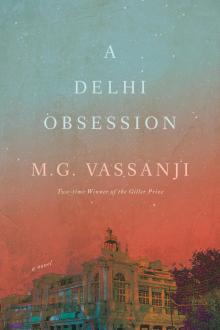 A Delhi Obsession
A Delhi Obsession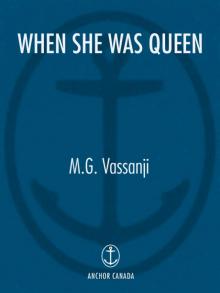 When She Was Queen
When She Was Queen No New Land
No New Land Nostalgia
Nostalgia Mordecai Richler
Mordecai Richler The Book of Secrets
The Book of Secrets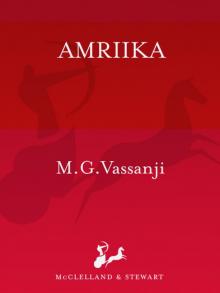 Amriika
Amriika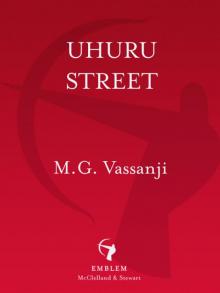 Uhuru Street
Uhuru Street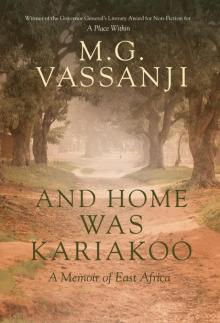 And Home Was Kariakoo
And Home Was Kariakoo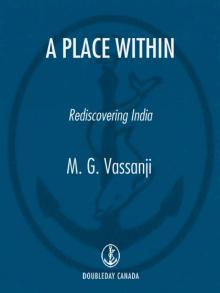 A Place Within
A Place Within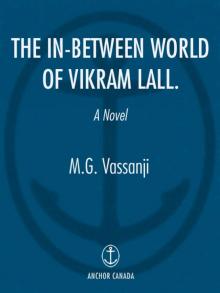 The In-Between World of Vikram Lall
The In-Between World of Vikram Lall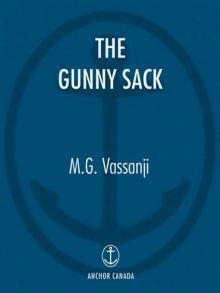 The Gunny Sack
The Gunny Sack